Home » Posts tagged 'Catholic University of Lublin'
Tag Archives: Catholic University of Lublin
The First Doctoral Degree by a Member of AΦR Team
On June 24th, 2025, a public defense of Mariam Sargsyan’s (Մարիամ Սարգսյան) doctoral thesis took place in the Institute of Philosophy, University of Zielona Góra (UZ). The title of her dissertation was Henryk Jakubanis (1879–1949) as a Researcher of Ancient Philosophy and Its Reception. The whole event was chaired by prof. Jacek Uglik and it proceeded in accordance with a regular schedule. At the start he curriculum of the candidate was presented by the supervisor, T. Mróz, who stressed the fact that M. Sargsyan was the first international student in the Doctoral School for Humanities and Social Sciences, and the only beneficiary of the research project NCN Preludium bis (with T. Mróz as a PI) and NAWA Preludium bis in the history of UZ.

Then M. Sargsyan took the floor and delineated the main points of her thesis which aimed at providing a synthetic study of H. Jakubanis as a researcher of ancient philosophy. Her study included a discussion of less-known aspects of H. Jakubanis’ life and work, in particular his academic positions in Kyiv; an analysis of his interpretations of selected Greek philosophers (Empedocles and Plato); and an examination of his methods etc.
A particular emphasis was put on the significance of his national sentiments and identity in motivating his decisions and shaping his career path; and on his contribution to the development of research in ancient philosophy and promotion of Polish culture in Kyiv in the early 20th century and subsequently in Lublin during the interwar period. The second part of the presentation was focused on H. Jakubanis scholarly achievements. His works were divided into three groups: 1) a monograph and translation of Empedocles (1906); 2) various studies on Plato and reception of Platonism, including an incomplete manuscript of his final university thesis (1900); 3) works promoting the value of ancient philosophy for general audiences, not only scholars, in the modern age.
One of the most significant results of Sargsyan’s dissertation was an identification three key influences in Jakubanis’ intellectual genealogy. They were: 1) his supervisor, Alexei Gilarov (1856-1938), whose role in forming Jakubanis’ biographical-genetic method and his interpretation of Plato was crucial; 2) Tadeusz Zieliński (1859-1944) and his conviction in the importance of the ancient legacy for modern culture; 3) the works by Eduard Zeller (1814-1908), which exerted impact on Jakubanis’ views on Empedocles and Plato.

On the whole, as Sargsyan’s dissertation demonstrates, Jakubanis was a historian of ancient thought, with a good background in classical languages, whose primary goal as a lecturer and scholar was to promote ancient thought. Contrary to his methods that can be considered today as outdated, his translation of Empedocles’ fragments still circulates in the Russian-speaking world and seems to be his lasting contribution to disseminating Greek philosophy.
The dissertation was assessed by three reviewers, they were prof. Zbigniew Nerczuk (Nicolaus Copernicus University in Toruń), prof. Steffen Huber (Jagiellonian University), and prof. Wiesława Sajdek (Jan Długosz University in Częstochowa). They all were present to read out loud their positive reviews and ask a couple of questions. They were particularly concerned with some ambiguities in Sargsyan’s account of Jakubanis’ career and academic titles he had obtained, since not all the documents have been preserved. Another key issue concerned some lacking points in broader historical and philosophical context of Jakubanis’ views, as Sargsyan preferred to focus on the direct impact exerted on him by the scholars he had referred to or collaborated with.

Finally, after hearing the reviews, questions and answers, the commission decided to award M. Sargsyan with a doctoral degree cum laude. Her dissertation has, no doubt, broadened and deepend the knowledge of the reception of ancient philosophy in Central and Eastern Europe in general, and of Henryk Jakubanis, a scholar writing on history of philosophy, who left his mark on the intellectual life in Poland, Ukraine and Russia, in particular.
After her successful doctoral defence M. Sargsyan returned to Armenia, her homeland, but we all hope here for further collaboration and for funding opportunities to publish her dissertation.
Dear Doctor Sargsyan!
Good luck with your research plans and see you back soon!
A Biographical Sketch on Henryk Jakubanis
Mariam Sargsyan, an AΦR researcher focusing on the legacy of H. Jakubanis, has recently published a paper Henryk Jakubanis (1879–1949) – a Historian of Greek Philosophy Between Kyiv and Lublin, which aims at discussing the entire academic path of this researcher of ancient philosophy, presenting his work in both periods of his life, connected to Kyiv and Lublin. The paper was published in Polish and can be downloaded here.
It is not insignificant to remark that Sargsyan’s paper has been published in an issue devoted to classical philology of “Roczniki Humanistyczne” (“Annals of Arts”, Vol. 72 No. 3, 2024, pp. 79-97), a journal edited at the Catholic University of Lublin (KUL), where Jakubanis used to work for over two decades of his life.
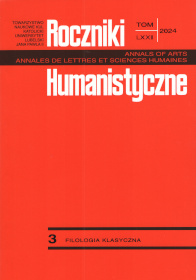
Jakubanis’ life began in the Russian Empire, and Sargsyan presents his family and his initial education it the gymnasium, with a focus on classical languages and humanities. Then the story proceeds to the Kyiv period of his life, including a brief sketch of the history of St Vladimir’s Imperial University of Kyiv and the researchers of the history of philosophy there, with an emphasis on Jakubanis’ academic supervisor, Alexei Gilarov (1856-1938). During his Kyiv period Jakubanis won a scholarship for a study visit in Germany, notably in Berlin, and was active as a university lecturer, teacher at various courses extra muros, and started to develop his academic and research career.
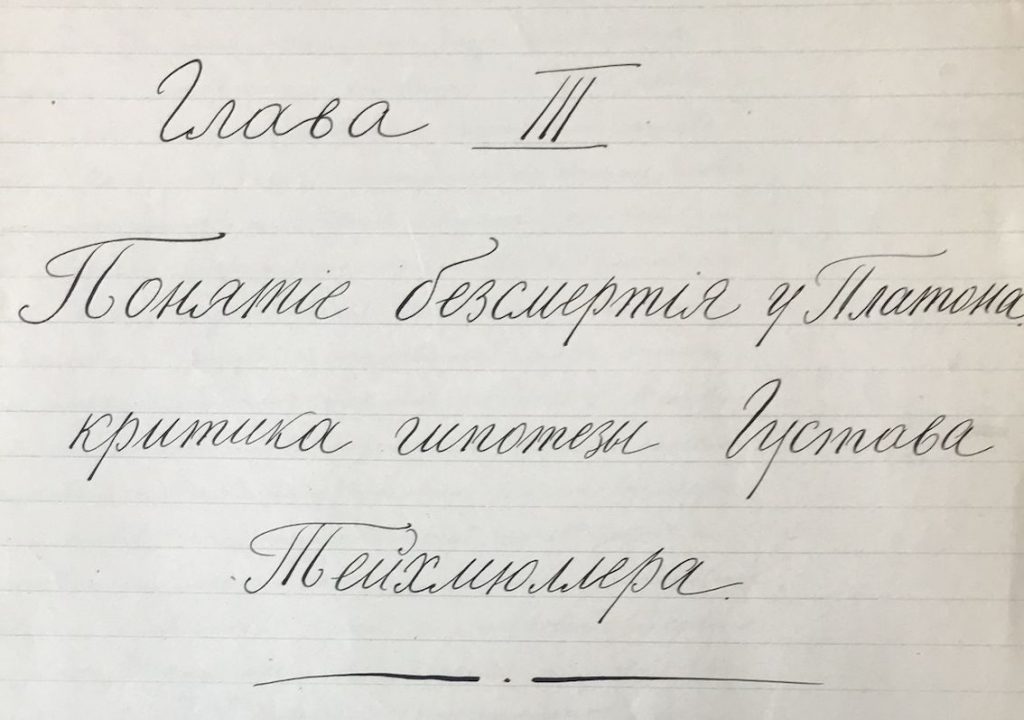
The Lublin period began in 1922 with Jakubanis’ repatriation from the then Soviet Ukraine to Lublin in the independent Republic of Poland. Thanks to the support of Tadeusz Zieliński (1859-1944), his former examiner in Kyiv, Jakubanis was hired at the University of Lublin. His lectures and seminars there, his life during the war, his works and impact are further discussed in the paper.
To sum up: Jakubanis spent 26 years of his life in Kyiv and 27 in Lublin where he died in 1949. These two periods were almost equal in terms of time, yet they were quite different. In Kyiv he composed most of his works and was formed as a researcher and teacher in classics in general and in the history of ancient philosophy in particular, while in Lublin he was rather occupied with university life and lecturing, and it did not allow him to focus on researching and publishing. For his entire life, however, he remained faithful to his interests in ancient philosophy and, according to his students, spared no energy to disseminate his knowledge and expierience in this field.
A Presentation on H. Jakubanis in Halle
On April 26, 2023, Mariam Sargsyan gave a talk at the Colloquium of Aleksander-Brückner-Zentrum für Polenstudien & Professur für Osteuropäische Geschichte in the Martin Luther University Halle-Wittenberg. The title of her presentation was: From Student at the Russian Imperial University in Kyiv to Respected Professor at the Catholic University in Lublin: The Career of Henryk Jakubanis, 1879–1949.
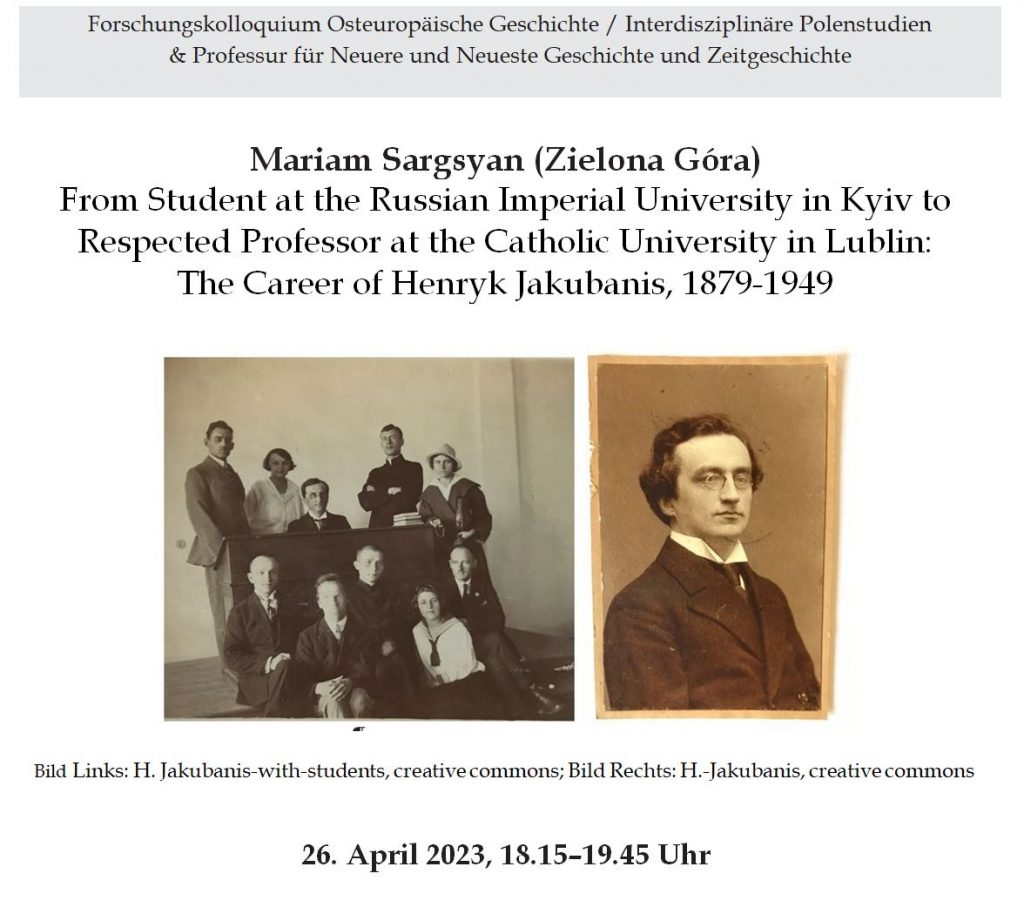
It was an important experience for M. Sargsyan to present a substantial part of her doctoral research, that is, the biography and major works of H. Jakubanis, to an audience consisting mostly of historians and not philosophers or historians of philosophy, and to receive their feedback and questions. The presentation, in addition to the highlights of Jakubanis’ life and career, included historical facts about Kyiv University, the 1st and 2nd World Wars, and peculiarities of academic life in pre-war Kyiv and post-war Lublin. The philosophical works of H. Jakubanis were also briefly discussed.
Results presented by M. Sargsyan, for example, approaching Jakubanis’ biography from the basically historical point of view, was in larger part an outcome of her NAWA scholarship at MLU Halle and her co-operation with the colleagues from Alexander-Brückner-Zentrum. It was an opportunity for her to take an attempt to compare life paths of Jakubanis with other imperial biographies, although at the moment it is impossible to research Kyiv archives.
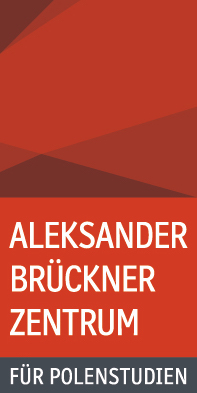
The audience at M. Sargsyan’s paper asked questiones on a variety of topics: the academic identity of H. Jakubanis, was he a classics scholar, a philosopher, a historian of philosophy, or an academic teacher. The question of the connection and relationship between H. Jakubanis and his supervisor, Alexei Gilarov (1856-1938), turned out to be interesting as well, for Gilarov had a significant influence on Jakubanis and his methods in historiography of philosophy, on his lecturing at the university, but at a certain moment, their paths diverged. Jakubanis’ relations with Tadeusz Zieliński (1859-1944), who had not spared benevolent gestures to his younger colleague, turned out to be particularly interesting for the audience. Methodological questions appeared as well and they concerned a possible reconstruction of Jakubanis’ academic contacts in a form of a network. What proved to be attractive for the audience was the graphic depiction of Jakubanis’ journeys.
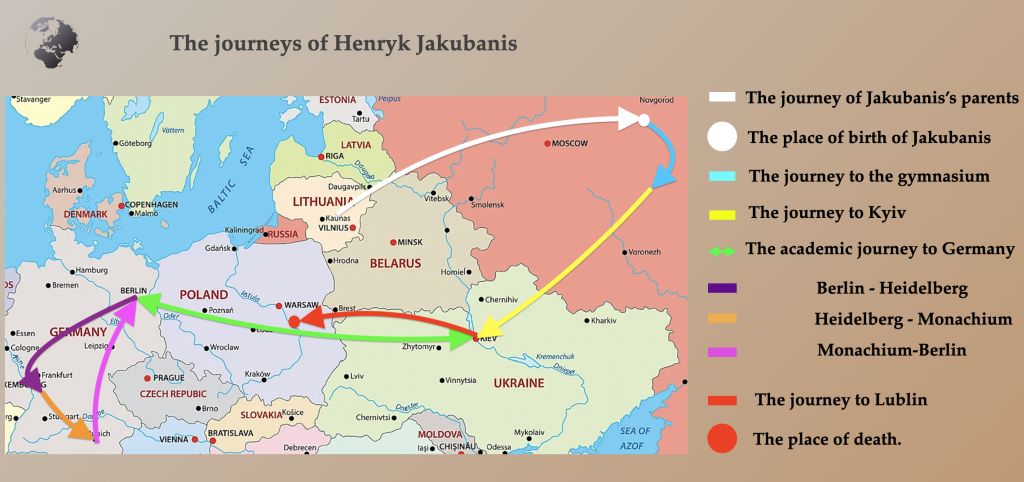
To sum up, M. Sargsyan’s presentation was informative for the public and beneficial for further development of her own research.
Two Members of AΦR at the Second Congress of Polish Philosophy
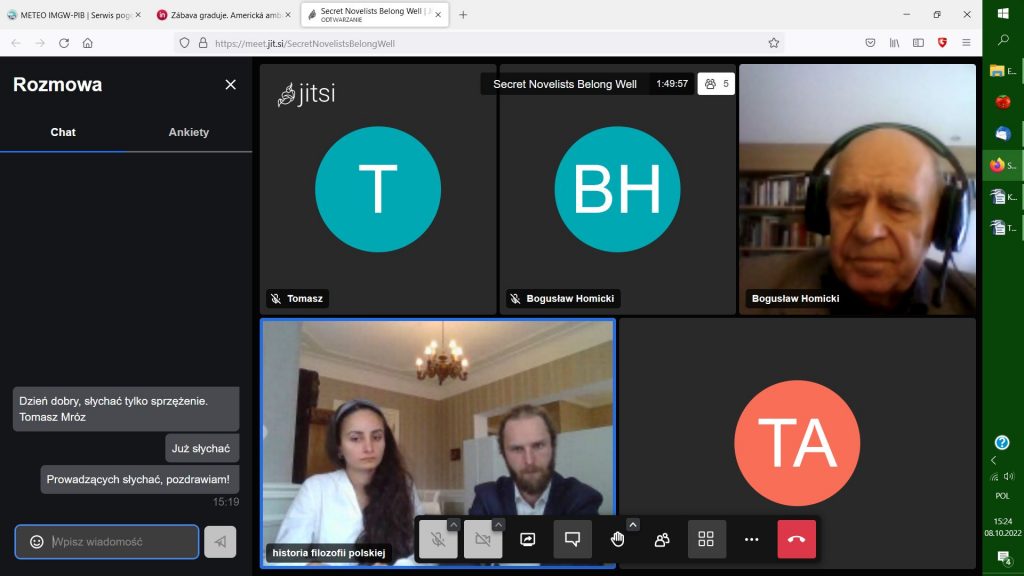
On October 7th-10th 2022 the Second Congress of Polish Philosophy took place in the Palace in Orla. Congress was held both on site and online. The organising institution of the Congress was the Chair of Philosophy (Department of History, University of Opole). The aim of this event was to research and develop Polish philosophical traditions. AΦR group members delivered their papers in the section devoted to the history of Polish philosophy.
The first lecture by an AΦR group member was titled Władysław Tatarkiewicz between Good and Happiness and was delivered by Adrian Habura. His paper was focused on axiological and ethical investigations of Tatarkiewicz in the years 1919-1947, and especially on his inaugural lecture On the Dual Understanding of Moral Act, which was delivered in October 1919 at the Stefan Batory University in Vilnius. Habura’s aim was to sketch the lines of development in Tatarkiewicz’s ethical investigations from the Good, as a topic of his postdoctoral dissertation (1919), to the happiness, from the book Analysis of Happiness (1947).
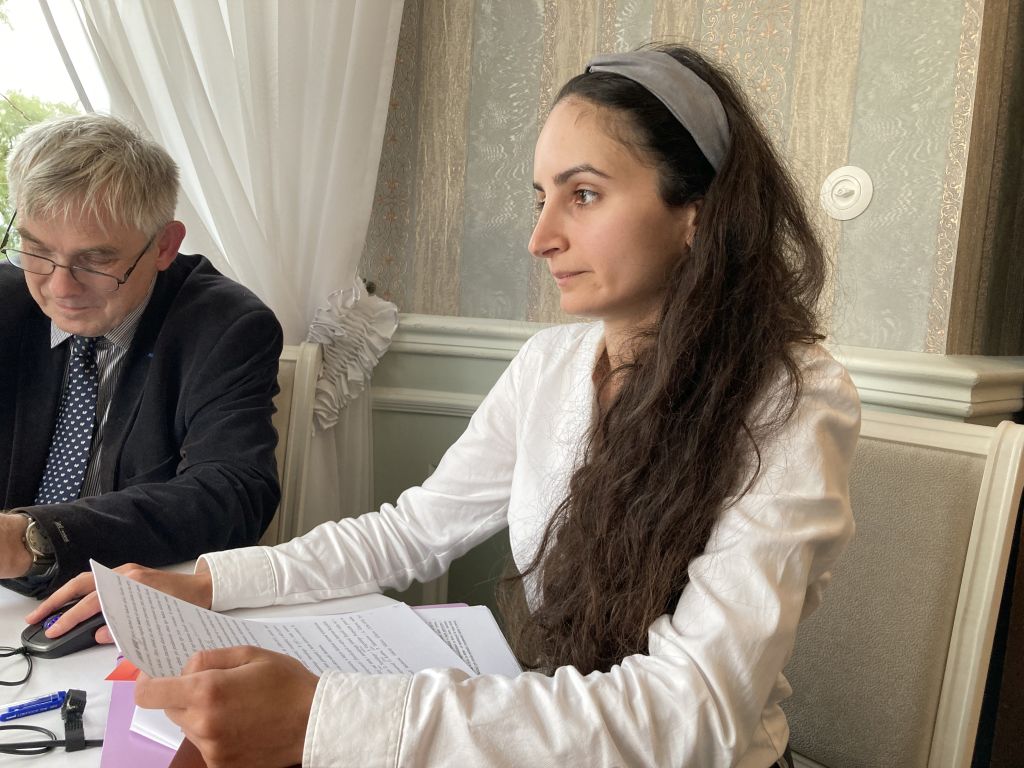
It was, however, only the second paper by an AΦR group member, which was devoted to the reception of ancient philosophy. It was Mariam Sargsyan’s presentation on Henryk Jakubanis, a Polish historian of Greek philosophy. The presentation’s title was Henryk Jakubanis (1879-1949) – a historian of Greek philosophy between Kyiv and Lublin.
The intellectual biography of this historian of philosophy is usually divided into two periods: Kyiv (1897-1922) and Lublin (1922-1949). The aim of Sargsyan’s paper was to present vita of Jakubanis considering both periods of his life and work. Lublin period is quite well known to Polish authors, but the significance of the Kyiv period remains unclear. In Lublin, Jakubanis headed the Department of Classical Philology and then the Department of Philosophy at the University of Lublin, which later became the Catholic University of Lublin.
It was, however, the Kyiv period which was the productive part of Jakubanis’ life, because in Kyiv he wrote his most important works: a book on Empedocles, consisting of a historical and philosophical study and a translation of the collected fragments of this thinker into Russian. Moreover, a series of articles on the significance of ancient philosophy, on the history of syllogism and on the relations between the ideas of Plato and Schiller, were composed by Jakubans in Kyiv. Sargsyan’s paper presented unknown facts from the biography of this historian of philosophy and discussed his works from the Kyiv period, which are usually barely mentioned.
Delivering their papers at the Congress was an important experience for both young researchers and it helped them develop their skills, not to mention social advantages of face to face scholarly meetings.
Archival Survey in Special Collections of the Catholic University of Lublin
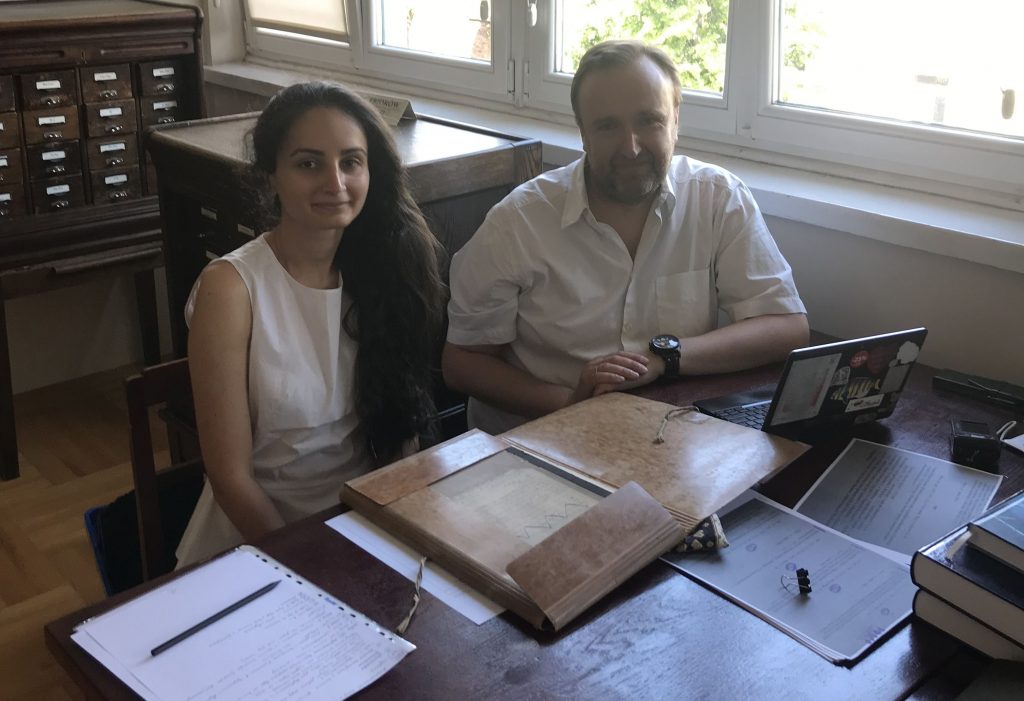
Two members of AΦR group. Mariam Sargsyan and Tomasz Mróz, took a research trip and visited Lublin to do an archival query in the Special Collections section in the University Library of the Catholic University of Lublin (KUL). Research work in Lublin took place at the turn of June and July 2022 and was focused on the legacy of Henryk Jakubanis (1879-1949), who had been a professor of KUL for over two decades, and was planned and funded as part of the doctoral project Preludium Bis 2.
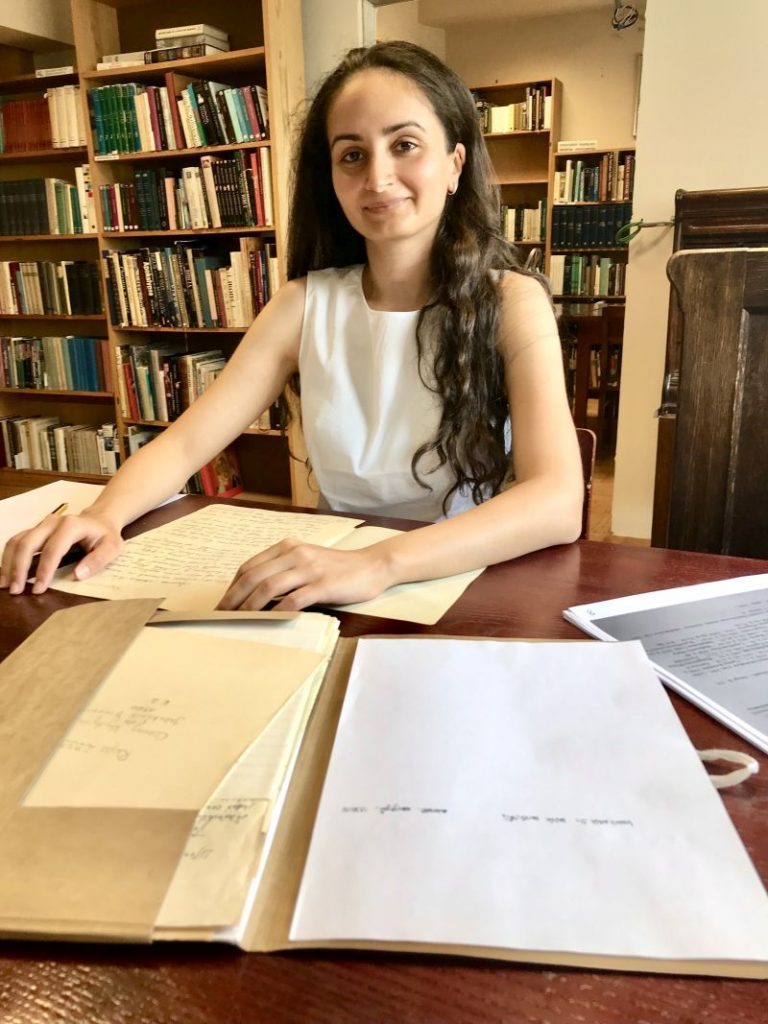
A preliminary archival survey in Jakubanis’ collections was carried out by T. Mróz in the autumn of 2010, but only now the entire collection has been searched through and it has been done by M. Sargsyan. Her doctoral thesis is devoted to Jakubanis and Lublin collections are in this regard essential. Jakubanis translated and studied ancient Greek philosophers and his work on Empedocles is his most important achievement. M. Sargsyan had a great opportunity to put her hands on the materials that have been produced and accumulated throughout the whole life of this historian of ancient philosophy, including his Kyiv period. The documents ranged from small personal details through official records, letters to manuscript drafts of his works in the history of philosophy.
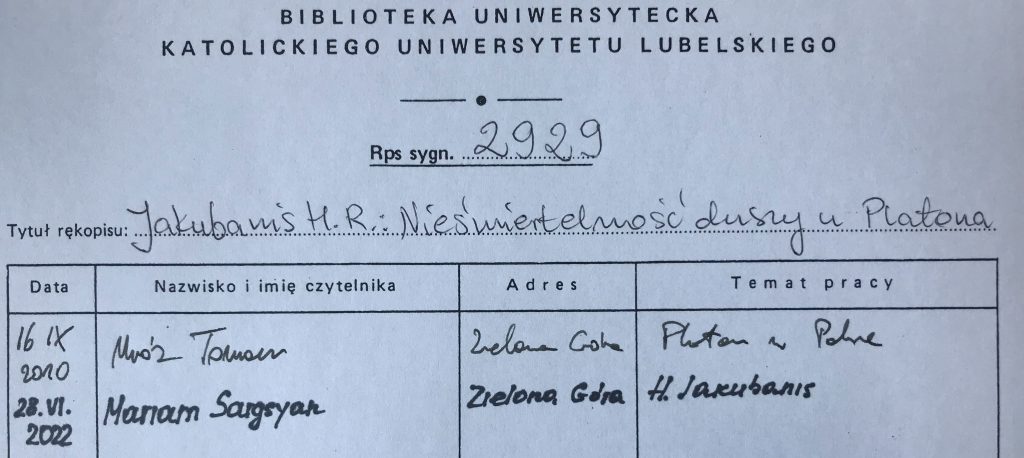
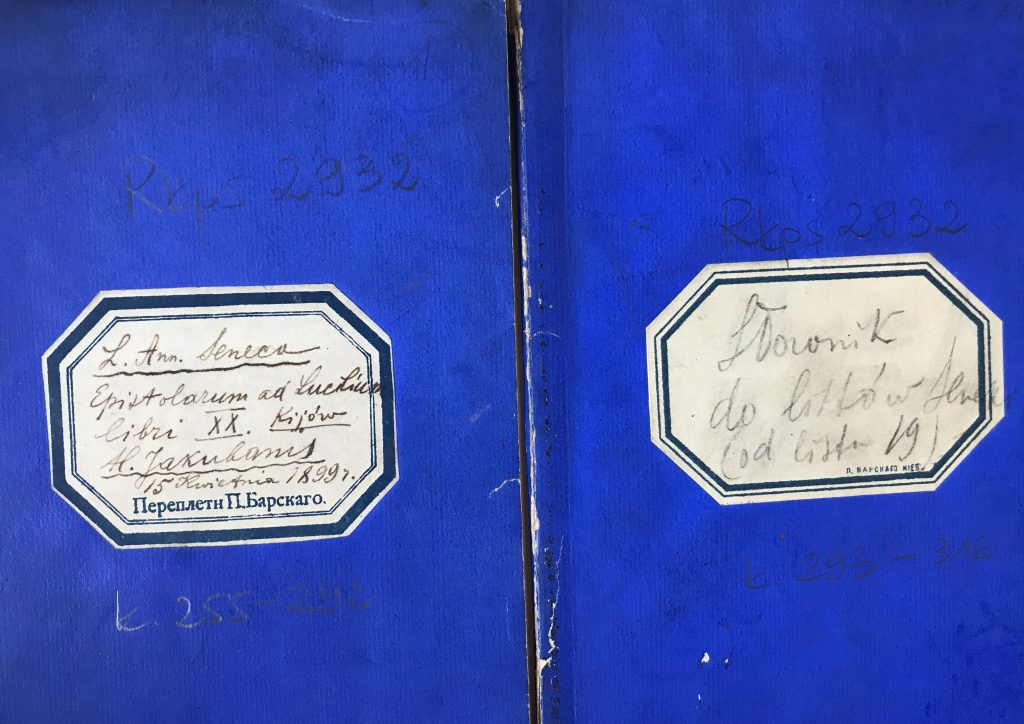
In the special collections of KUL M. Sargsyan had a unique opportunity to take her first steps in researching manuscripts and archival resources. This experience will be crucial for her further development as a historian of philosophy working in the field of AΦR. Her work was possible thanks to the consent of the Head of the KUL Library, Katarzyna Kołakowska, Ph.D., and proceeded smoothly, without difficulties for the Special Collections Reading Room staff spared no efforts to help and facilitate M. Sargsyan’s research.
Covers of Jakubanis’ notebooks with his comments
and preparatory notes on Seneca’s letters.
Recent commentaries